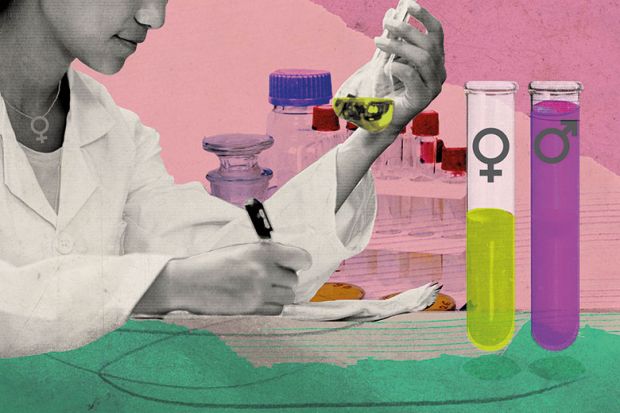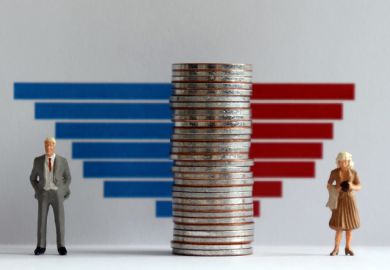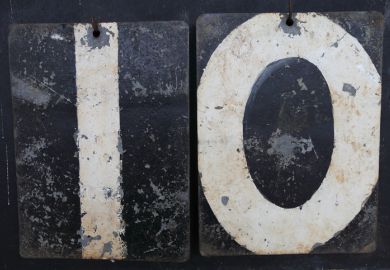It was no surprise to see from UK universities’ latest annual statistics that the gender pay gap remains stubbornly high. There simply are not as many women as men at the top of the pay scales – and there are many more in the bottom grades.
If, as we would all like to believe, promotion is determined purely on merit, why should this be so? This problem is about so much more than women’s choices about families. The system needs fixing, not the women. But which bits, and how?
We suggest that publishers and journal editors have a key role to play that is often ignored or overlooked. Over hundreds of years, the publication of papers has been the main route for communicating science between researchers. But more recently, the number of papers published and the impact factor of the journal in which they appear have become accepted, if crude, proxies for assessing a researcher’s worth – for promotion, job applications and funding new research projects. The result is that universities are, in effect, outsourcing decisions about hiring and promotions to external organisations whose chief motivation is not to get this morally “right” but – in the case of commercial publishers, at least – to make money.
The evidence suggests that the current publishing model, set up by men for men, is beset with unconscious bias. The knock-on effect is not simply that much fantastic research never sees the light of day. It is also that many talented people from minority backgrounds do not see their careers progress in the way their excellence would warrant. This is not good for science, let alone the individuals. Science has always advanced by building on others’ achievements: under-representation of any part of the community impacts all of us by limiting progress and constraining research directions for no good scientific reasons.
Publishers and editors need to take more responsibility. This is not simply about inviting more women to write review articles, monitoring the percentage of women in the reviewer pool or collecting statistics on how many papers with female last or first authors are published – important though these measures are. If the best researchers’ work is to see the light of the day, and if, as a consequence, the best researchers are to be properly rewarded, we need to do far more as a community.
To take one telling statistic, Nicole Neuman, editor of Trends in Biochemical Sciences, reports that just 13 per cent of pre-submission enquiries to her journal come from women. Why? Is it because women are fragile snowflakes who cannot face rejection? Or is it that their experience tells them that they will waste a lot of time trying to publish in journals with high impact factors? Who is checking what happens when a paper with a female senior author hits the editor’s desk?
Bias is well known to be subtle. It is not just men who are biased against women; so too are women, as a 2012 study of job applications published in PNAS showed. So increasing the number of women in the reviewer pool, while giving more women useful experience, is unlikely to affect the number of female-authored papers accepted. Nor, correspondingly, is having more women on the editorial team of the journals.
Who is reviewing the reviewers and checking that they are not biased, consciously or unconsciously? After all, it was the authors who brought to public attention the case, in 2015, of the referee who told a pair of female scientists to get a male co-author. The editor had not seen fit to tear up the referee’s totally unacceptable report.
We have been able to find little evidence in the literature about how long papers with female authors take to be published in comparison with those with male authors, or on whether they are likely to have to go through more resubmissions before final acceptance, let alone on whether implicit or explicit sexism is to be found in the actual referees’ reports. But an analysis of papers in economics published last October concludes that “referees of both genders appear to set a higher bar for female-authored papers”; it would be interesting for comparable analyses to be done in different disciplines.
Our challenge to publishers, editors and referees alike is to do more to check at every stage that there is no lurking bias, implicit or explicit – and to think about the knock-on effects for gender equality of everything they do.
And universities should think about the unreflective ways that data around publishing may be used in their promotions and appointments processes. If, as anecdote would suggest, women get harsher referees’ comments, more revisions demanded and more outright rejections from editors even before review, then the consequences are that a significant sector in higher education is expending time and energy for no useful outcome.
We need much more sophisticated and wide-ranging consideration of the whole publication system. Otherwise, endemic bias will continue to skew the academic population.
Melinda Duer is professor of biological and biomedical chemistry and deputy warden of Robinson College, Cambridge. Dame Athene Donald is professor of experimental physics and master of Churchill College, Cambridge.
POSTSCRIPT:
Print headline: Turbocharge drive to ensure women enjoy equal chance to shine
Register to continue
Why register?
- Registration is free and only takes a moment
- Once registered, you can read 3 articles a month
- Sign up for our newsletter
Subscribe
Or subscribe for unlimited access to:
- Unlimited access to news, views, insights & reviews
- Digital editions
- Digital access to THE’s university and college rankings analysis
Already registered or a current subscriber?






